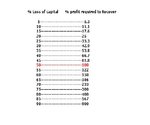Doomberg
Established member
- Messages
- 960
- Likes
- 75
Ok so i seen an interesting thread from 7 years ago and think it would be good to see what your opinions are on this... Firstly i'm aware that the below figures are not 100% verbatim as there are many factors that would stop you from turning 10k in to 1million in exactly 22 months with 1% returns each day. However it's very interesting and is mathematically correct, if the money was not touched for this time and was compounded with each increase then this is the increase you would see.
1. If you started trading with £10,000 and averaged a 1% return every day
2. Reinvested that return and got another 1% the next day ect.
3. Traded 5 days of the week, 52 weeks of the year
Then you would have £1,000,000 in 1 year and 10 months
Here's more examples of how effective compounding can actually be:
1% return a day on your capital - your capital DOUBLES every 71 days
2% return a day on your capital - your capital DOUBLES every 37 days
3% return a day on your capital - your capital DOUBLES every 26 days
4% return a day on your capital - your capital DOUBLES every 20 days
5% return a day on your capital - your capital DOUBLES every 17 days
6% return a day on your capital - your capital DOUBLES every 13 days
Whats your views on the above stats? Also how often do you guys compound?
Say for example if you made an increase on most trading days, do you take
that in to account instantly or do you wait for a week or a month to increase
the stake sizes to larger amounts?
1. If you started trading with £10,000 and averaged a 1% return every day
2. Reinvested that return and got another 1% the next day ect.
3. Traded 5 days of the week, 52 weeks of the year
Then you would have £1,000,000 in 1 year and 10 months
Here's more examples of how effective compounding can actually be:
1% return a day on your capital - your capital DOUBLES every 71 days
2% return a day on your capital - your capital DOUBLES every 37 days
3% return a day on your capital - your capital DOUBLES every 26 days
4% return a day on your capital - your capital DOUBLES every 20 days
5% return a day on your capital - your capital DOUBLES every 17 days
6% return a day on your capital - your capital DOUBLES every 13 days
Whats your views on the above stats? Also how often do you guys compound?
Say for example if you made an increase on most trading days, do you take
that in to account instantly or do you wait for a week or a month to increase
the stake sizes to larger amounts?

